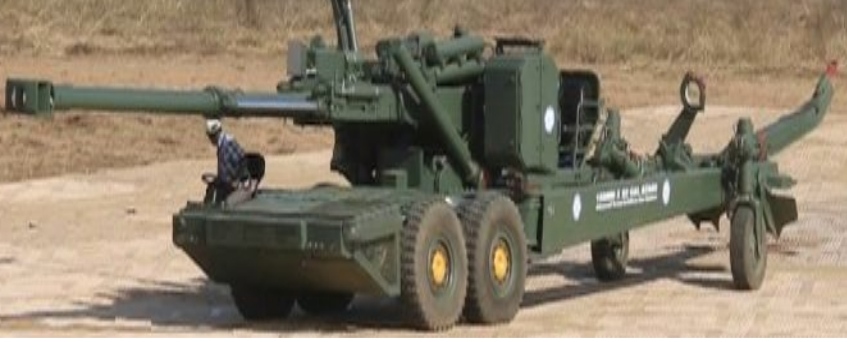DRDO Will Begin Technical Trials Of Made-In-India Towed Artillery

Confirmatory technical trials in the deserts of the indigenous Advanced Towed Artillery Gun System (ATAGS), being developed by the Defence Research and Development Organisation (DRDO) along with private firms Bharat Forge and TATA Power SED, will begin in June.
After the summer trials this year, Army will then carry out the Users Trials and then only orders can be placed in the industry, following which the system will become operational in the armed forces. They added that the validation trials at high altitude areas, including mobility trials in hilly and mountainous terrain have been completed.
The ATAGS is part of the Army’s Field Artillery Rationalisation Plan, which had been drawn up in 1999. According to this plan, the Army is supposed to have both Self Propelled and the towed system artillery guns which is meant to be a 155mm x 52 calibre.
With the global procurement plans for a towed gun faltering despite multiple attempts, the project for ATAGS was rolled out by the DRDO around 2010. The ATAGS, which is being developed by the DRDO with the two private firms, fired for the first time in a fully integrated model in 2016. This development came even as the Army has been pursuing a separate process for procurement of towed guns from abroad under the ‘Make In India’ initiative.
The gun that has finally emerged as the lowest bidder for this process was the ATHOS of the Israeli firm Elbit, in 2019. The deal was for the supply of 400 guns and indigenous production of another 1,180 guns by the Ordnance Factory Board (OFB), under a full Transfer of Technology (TOT) process.
However, the Army has now plans to procure only 400 of the ATHOS, but the DRDO is objecting even to this and says the ATAGS is better and is the weapon of the future.
A final decision on ATHOS is still pending as reported on 28 May.
Defence sources said that the development of ATAGS has been completed and is presently under PSQR (Weapons procurement and qualitative requirements) trials to finalise the final configuration of the gun system.
However, the Army has a “few issues of concern”.
Sources said that the first among these is the aspect of extra weight, which may impact on the operational performance of the gun system in mountainous and high altitude terrain.
The ATAGS is said to weigh around 18 tonnes. In comparison, the ATHOS weigh less than 15 tonnes.
Those advocating for the ATAGS say that if the weight is indeed an issue, other systems like the Dhanush gun can be used for the mountains besides the lightweight howitzers along with the indigenous towed system.
“Not all guns have to operate in the same way across all terrains. In tanks, we have the T-90 and T-72 which can operate easily in the mountains and can also be airlifted there. But we also have the Arjun, which cannot operate in the same way it would in desert areas,” a defence expert, who did not wish to be identified, said.
ATAGS program sources said the self-propelled mobility of this system is high and it is capable of crossing all Indian bridges and terrain. They also said that the in weight category it is comparable with other comparable gun systems in the world.
Industry sources said that the most significant achievement during the second phase of PSQR Winter Trials was moving the guns to the Northern-most point of operational area (Lukrep) in the Plateau areas of North Sikkim.
The movement was undertaken mostly during the hours of darkness to facilitate undisturbed movement of tourists and civilian vehicles and at the same time maintain confidentiality of the gun system with our adversaries.
They said that ATAGS (Bharat Forge) has demonstrated efficient towed movement in the treacherous terrain climbing altitudes up to 15,500 ft.
“Movement to Lukrep meant covering 341 kilometres and was tested over 10 days. ATAGS could negotiate the otherwise un-accessible mountainous terrain with steep gradient and narrow Hair-Pin Bends with ease, without needing to unhook the Gun from the Tower. In similar terrain, other systems need to be unhooked and moved in self-propelled mode, thereby increasing the overall travel time,” a source said.
He added that the total distance travelled by the ATAGS in mountains and high altitude was 526 kms as against 23 Km mobility test done for foreign guns.
“So there cannot be any doubt on the mobility component of the ATAGS. The foreign gun should also be tested at the same location if someone believes that it is better,” the source added.
He added that the the ease with which the Bharat Forge Gun could traverse the complete stretch, stands testimony to the ability of the Guns to move into the remotest of places, in any type of terrain.
Defence sources have also voiced other concerns about the ATAGS, however. A second concern they said is the “inability of the gun” system to meet the critical performance parameters, especially with regard to rates of fire.
ATAGS program sources said that the rate of fire includes the burst firing of five rounds in one minute, intense firing of 10 rounds in two-and-a-half minutes and a sustained rate of 60 rounds in sixty minutes. In comparison, the Elbit Systems claims ATHOS can fire three rounds in 30 seconds, 12 rounds in three minutes, and 42 rounds in sixty minutes.
The third concern expressed is the September 2020 accident during the internal validation trials of the ATAGS in a firing range. The barrel of the gun burst while firing a round. Incidentally the cost is also a factor. While the ATHOS will cost less than Rs 11 crore per piece, the ATAGS is said to be costing anywhere between Rs 16-18 crore.
One area where the ATAGS outguns other systems is the range. The ATAGS’s range with Extended Range Sub-Bore Boat Tail (ERFB BT) ammunition is 35 km and with ERFB BB (Base Bleed) ammunition is 45 km. The ATAGS has actually fired at a range of 47 KMS in 2017.
It is said that when the ATAGS will finally be ordered, both private firms will get orders, but the lowest bidder would get the largest share – 60 per cent or more.
Both guns – Bharat Forge and TATA – have the same performance parameters and the final contract will be awarded based on the cost cited.




